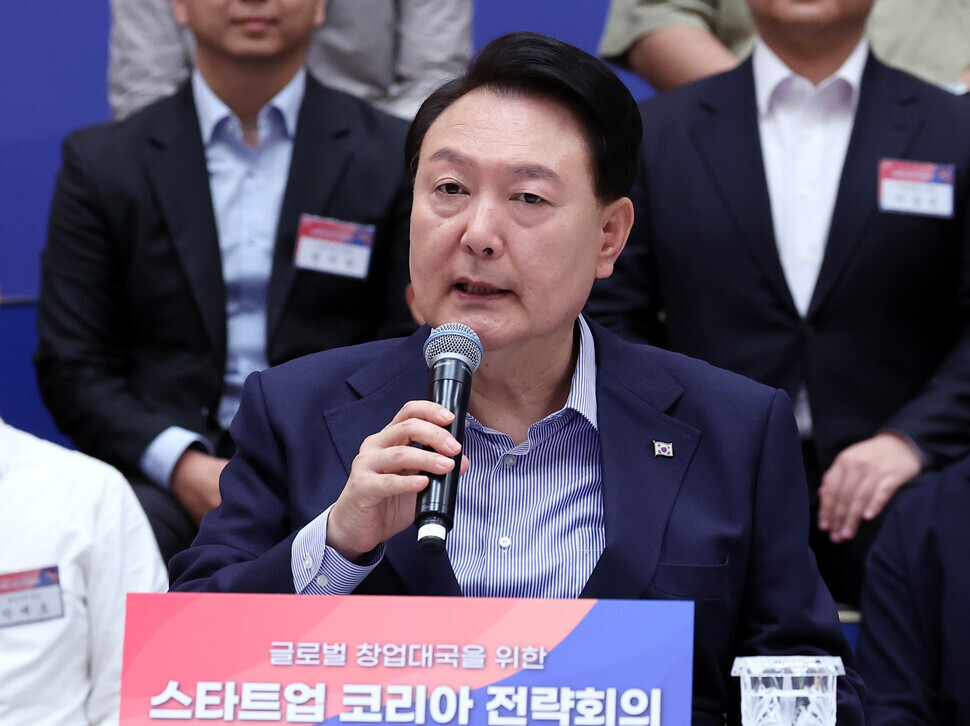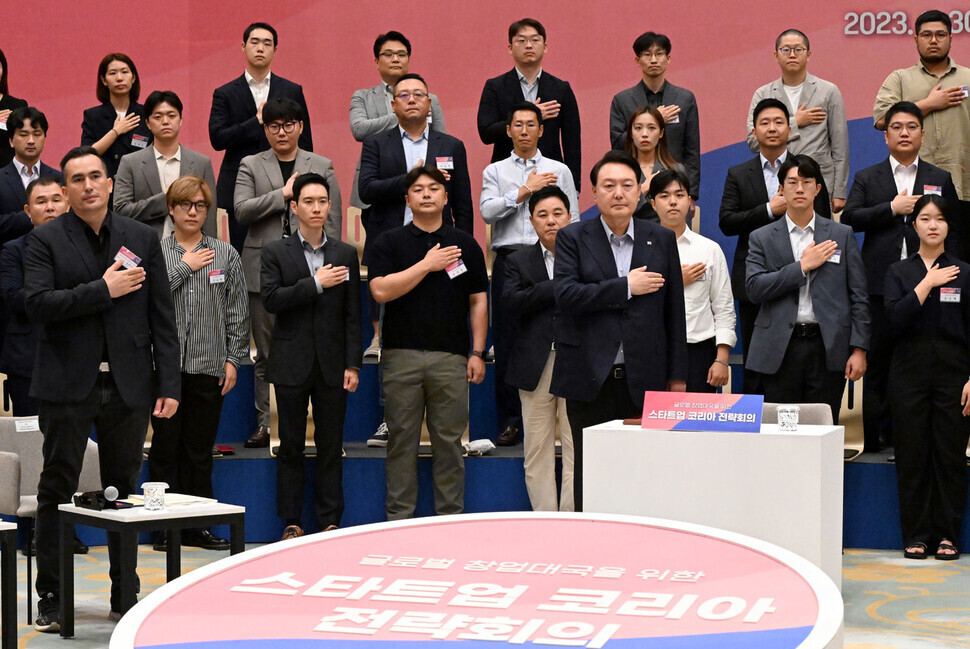hankyoreh
Links to other country sites 다른 나라 사이트 링크
[News analysis] The origins of Yoon’s anti-communist politics

In 2023, South Korean President Yoon Suk-yeol has brandished an outdated political ideology of anti-communism, remarking that “the most important thing is ideology.” The president’s recent rhetoric has elicited various interpretations about its origins.
Many people believe that Yoon’s abrogation of his responsibility for uniting the nation and his message of division are turning away nearly everyone except for hardcore supporters. But Yoon appears unfazed by such criticism.
Potential reasons for his behavior include his longstanding convictions about liberalism, his self-righteous personality, the representation of the “new right” in his Cabinet and staff, and the sharp polarization of the political landscape.
Yoon has doubled down on his anti-communist position in recent days, as evidenced by remarks made in two recent speeches.
“The forces of communist totalitarianism have always disguised themselves as democracy activists, human rights advocates or progressive activists while engaging in despicable and unethical tactics and false propaganda,” Yoon said during his commemorative message for Liberation Day, on Aug. 15.
“The forces of communist totalitarianism — both true believers and opportunistic followers — are carrying out psychological warfare designed to disrupt our free society through fabricated narratives, propaganda and demagoguery, and they’ll never stop doing so,” the president said during a conversation on unification with members of the Peaceful Unification Advisory Council.
Such remarks suggest the president means to further refine his “ideological politics.”
“When he entered politics, he looked like a moderate, but he’s gradually moving further to the far right,” said one lawmaker with the ruling People Power Party (PPP).
Yoon’s anti-communist attitude was in fact visible at the beginning of his political career, but it wasn’t as prominent as it is now.
When Yoon stepped down as prosecutor-general and announced he would embark upon a political career in 2021, he was fueled by anger at the activist circles that dominate the Democratic Party. He didn’t bother hiding his hostility in the press conference he held to announce his political ambitions in June 2021, referring to “a government that fleeces the public,” “agitators who speak of tyranny and autocracy as democracy” and “a corrupt vested-interest cartel.”

But one year after Yoon took power, he has been broadcasting these ideas ever more loudly not only to his supporters in the conservative camp but to the public as a whole. Figures inside the ruling party view this as an expression of his confidence or sense of vocation in his second year in office.
“He seems to have arrived at this message after reviewing all areas of governance over the past year. He seems to have the strong sense that, as president, he can’t just leave things as they are today,” a member of Yoon’s party told the Hankyoreh on Wednesday.
North Korea’s repeated shows of force over the past year, the strike by cargo truckers associated with the Korean Public Service and Transport Workers’ Union - TruckSol, and the discovery of a spy ring in Changwon with alleged links to organized labor have prompted Yoon to bring anti-communism to the fore, the PPP member said.
While Yoon has emphasized freedom and liberal democracy as being the preeminent values and political systems since his inaugural speech, it’s becoming increasingly clear that he’s not talking about freedom in the broad sense, which would encompass diversity and tolerance, but freedom in the narrow sense as a force opposing communism and totalitarianism.
Yoon’s go-it-alone personal style and the political leanings of his Cabinet members and aides are reinforcing his reliance on ideological politicking, numerous pundits say, including Ryu In-tae, the former secretary-general of the National Assembly.
“Yoon is a late convert to the new right. People who join a cause late in life tend to be more passionate about it. I think Yoon is motivated partly by resentment that his approval ratings aren’t rising despite his best efforts. That resentment seems to be raising suspicions that his opponents are opposed to the state itself,” Ryu said in a radio interview with CBS on Wednesday.
In fact, Yoon has placed a number of people who served under former President Lee Myung-bak in key positions in his own administration, including Lee Dong-kwan as chief of the Korea Communications Commission and Kim Tae-hyo as first deputy director of the National Security Office. He has also eagerly endorsed proposals from the new right, including a push to remove busts of Hong Beom-do, a general in the Korean independence movement, from public places. Many see that as suggesting that Yoon means to wade into ideologically fraught debates over Korean history.
This context also helps explain Yoon’s push to improve relations with Japan in the absence of a national consensus, his emphasis on the values of freedom and human rights and his drive to place Korea on the front lines of a coalition with the US and Japan in confrontation with North Korea, China and Russia.
These behaviors have prompted two conflicting interpretations. Park Jie-won, the former director of the National Intelligence Service, said, “It would seem that Yoon is being swayed by the media and high-placed advisors who are calling for the eradication of leftist political parties and organizations.” But another political pundit opined that “Yoon is acting on his own ideas.”
Some think that Yoon, as a political neophyte without a solid base of support, is feeding red meat to conservatives as part of a strategy of consolidating support. But the prevailing view in the political establishment is that Yoon’s radical ideological campaign is unlikely to benefit the PPP in the greater Seoul area or among political moderates in the general election, which is coming up next April.
In fact, ruling party lawmakers in the capital area have been vocal about their concerns. “Ideological debates are useful for kindling enthusiasm among one’s supporters, but they won’t help you win a general election,” said one PPP lawmaker, referring to fears of a bloodbath in the capital area.
While ruling party lawmakers ought to be communicating what the public feels to the president, at present, they’re largely worried about rubbing the president the wrong way, which could hurt their chances of being nominated for the general election.
“Given the fierce conflict between the two sides in politics today, some may well think that sending messages that turn off moderates could still serve their strategic interests. The relative merits of the president’s divisive strategy of only appealing to those who are already firmly in his camp will become clear down the road,” said Ahn Byong-jin, a professor of political science at Kyung Hee University’s Global Academy for Future Civilizations.
By Kim Mi-na, staff reporter; Son Hyun-soo, staff reporter; Kang Jae-gu, staff reporter
Please direct questions or comments to [english@hani.co.kr]

Editorial・opinion
![[Column] Season 2 of special prosecutor probe may be coming to Korea soon [Column] Season 2 of special prosecutor probe may be coming to Korea soon](https://flexible.img.hani.co.kr/flexible/normal/500/300/imgdb/original/2024/0426/3317141030699447.jpg) [Column] Season 2 of special prosecutor probe may be coming to Korea soon
[Column] Season 2 of special prosecutor probe may be coming to Korea soon![[Column] Park Geun-hye déjà vu in Yoon Suk-yeol [Column] Park Geun-hye déjà vu in Yoon Suk-yeol](https://flexible.img.hani.co.kr/flexible/normal/500/300/imgdb/original/2024/0424/651713945113788.jpg) [Column] Park Geun-hye déjà vu in Yoon Suk-yeol
[Column] Park Geun-hye déjà vu in Yoon Suk-yeol- [Editorial] New weight of N. Korea’s nuclear threats makes dialogue all the more urgent
- [Guest essay] The real reason Korea’s new right wants to dub Rhee a founding father
- [Column] ‘Choson’: Is it time we start referring to N. Korea in its own terms?
- [Editorial] Japan’s rewriting of history with Korea has gone too far
- [Column] The president’s questionable capacity for dialogue
- [Column] Are chaebol firms just pizza pies for families to divvy up as they please?
- [Column] Has Korea, too, crossed the Rubicon on China?
- [Correspondent’s column] In Japan’s alliance with US, echoes of its past alliances with UK
Most viewed articles
- 1Is Japan about to snatch control of Line messenger from Korea’s Naver?
- 2‘We must say no’: Seoul defense chief on Korean, USFK involvement in hypothetical Taiwan crisis
- 3Up-and-coming Indonesian group StarBe spills what it learned during K-pop training in Seoul
- 4[News analysis] Using lure of fame, K-entertainment agency bigwigs sexually prey on young trainees
- 5[Column] Park Geun-hye déjà vu in Yoon Suk-yeol
- 6Is N. Korea threatening to test nukes in response to possible new US-led sanctions body?
- 7Division commander ordered troops to enter raging flood waters before Marine died, survivor says
- 8S. Korea “monitoring developments” after report of secret Chinese police station in Seoul
- 9Will NewJeans end up collateral damage in internal feud at K-pop juggernaut Hybe?
- 10Report reveals toxic pollution at numerous USFK bases